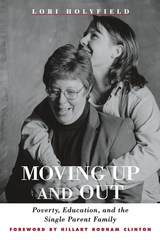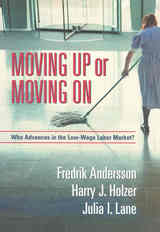2 books about Moving Up

Moving Up And Out
Poverty, Education & Single Parent Family
Lori Holyfield, foreword by Hillary Rodham Clinton
Temple University Press, 2001
Single parent families in the United States have almost tripled in the past few decades. A huge majority of these families are female headed. In American culture it is not so important that we all be equal so much as it is that we all have equal opportunities. Yet sometimes we turn a blind eye to those who need us most. In fact, when it comes to single parent families, it is as if the barriers are too great, the issues too complex. We wind up reducing the debate to its lowest common denominator. Ironically, it is the families who are most affected that get tangled in the political barbed wire and hidden behind numbing statistics. Moreover, community responses, those small grassroots organizations who care deeply and give whole-heartedly are seldom celebrated, seldom recognized for their empowering efforts. Moving Up and Out focuses on just such a program, the Arkansas Single Parent Scholarship Fund, which has since 1984 provided scholarships for single parents interested in obtaining their post-secondary education. In this story of a highly successful nonprofit, Lori Holyfield (herself a recipient of a scholarship) draws upon the voices of single parents to consider the barriers and struggles faced as they attempt to obtain secondary education and change the lives of both themselves and their children. The help this program has brought to Arkansas residents is needed throughout the country.
[more]

Moving Up or Moving On
Who Gets Ahead in the Low-Wage Labor Market?
Fredrik Andersson
Russell Sage Foundation, 2005
For over a decade, policy makers have emphasized work as the best means to escape poverty. However, millions of working Americans still fall below the poverty line. Though many of these "working poor" remain mired in poverty for long periods, some eventually climb their way up the earnings ladder. These success stories show that the low wage labor market is not necessarily a dead end, but little research to date has focused on how these upwardly mobile workers get ahead. In Moving Up or Moving On, Fredrik Andersson, Harry Holzer, and Julia Lane examine the characteristics of both employees and employers that lead to positive outcomes for workers. Using new Census data, Moving Up or Moving On follows a group of low earners over a nine-year period to analyze the behaviors and characteristics of individuals and employers that lead workers to successful career outcomes. The authors find that, in general, workers who "moved on" to different employers fared better than those who tried to "move up" within the same firm. While changing employers meant losing valuable job tenure and spending more time out of work than those who stayed put, workers who left their jobs in search of better opportunity elsewhere ended up with significantly higher earnings in the long term—in large part because they were able to find employers that paid better wages and offered more possibilities for promotion. Yet moving on to better jobs is difficult for many of the working poor because they lack access to good-paying firms. Andersson, Holzer, and Lane demonstrate that low-wage workers tend to live far from good paying employers, making an improved transportation infrastructure a vital component of any public policy to improve job prospects for the poor. Labor market intermediaries can also help improve access to good employers. The authors find that one such intermediary, temporary help agencies, improved long-term outcomes for low-wage earners by giving them exposure to better-paying firms and therefore the opportunity to obtain better jobs. Taken together, these findings suggest that public policy can best serve the working poor by expanding their access to good employers, assisting them with job training and placement, and helping them to prepare for careers that combine both mobility and job retention strategies. Moving Up or Moving On offers a compelling argument about how low-wage workers can achieve upward mobility, and how public policy can facilitate the process. Clearly written and based on an abundance of new data, this book provides concrete, practical answers to the large questions surrounding the low-wage labor market.
[more]
READERS
Browse our collection.
PUBLISHERS
See BiblioVault's publisher services.
STUDENT SERVICES
Files for college accessibility offices.
UChicago Accessibility Resources
home | accessibility | search | about | contact us
BiblioVault ® 2001 - 2024
The University of Chicago Press









